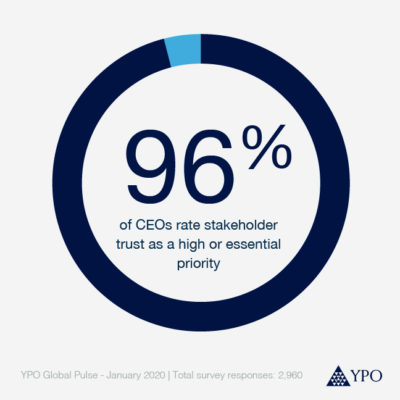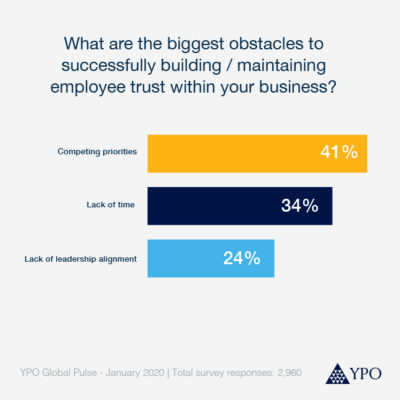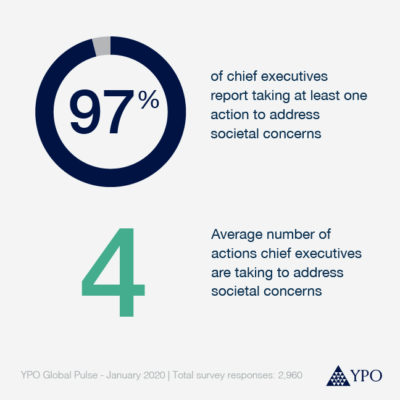Today’s forward-thinking chief executives are moving toward a people-centered leadership approach that places stakeholder trust right at the top.
Most CEOs think it’s important to build trust: 96% of chief executives rate building and maintaining trust with stakeholders as a high or essential priority, compared with other business priorities.
And this is across the globe.
In the U.S., it’s a 98% net high/essential priority. It’s a 97% net high/essential priority in Africa, Australia/New Zealand and Europe, and 96% in Latin America.
Furthermore, nearly half of these executives – 42% – say that the importance they place on building trust with stakeholders has increased over the past five years. (Meanwhile, 57% say the importance they’ve placed on building trust with stakeholders hasn’t changed, and 2% would go so far as to say they place less importance on this category.)
But building and maintaining trust is no easy task, and executives cite many reasons for this.
Among them: competing priorities, lack of time and lack of alignment within senior leadership threaten the effectiveness of trust-building efforts.
According to the Global Pulse Survey, chief executives find it easier to build trust with their vendors (48%) and investors (45%) than employees (40%) and customers (36%). Local communities and the general public/media came in at 29% and 23%, respectively. Within the company, there also are differences with how comfortable executives feel about building trust with their teams. Fifty-eight percent of chief executives say it’s easy or somewhat easy to build trust with their senior leaders, whereas only 40% find it easy or somewhat easy to build trust with employees. But trust starts at home, according to the Global Pulse Survey. The main obstacles to building employee trust are conflicting priorities and a lack of time. So what are chief executives doing to build trust within their organization? It comes down to regular communication (42%) and transparency (35%). Gathering feedback/listening came in at 22% followed by words matching actions and following through with commitments at 21%. Time is money, and most chief executives face many demands. But it starts with measuring employee trust and many chief executives may still be stuck on this step. Forty-three percent of CEOs have not measured employee trust, but they’re interested in doing so. Just 37% say they have measured employee trust and 20% have not. Also, the top sources of information that chief executives have used in their efforts to learn how to build and maintain employee trust within their business is pretty specific: Most rely on personal experience (67%). Then came employees themselves (42%) and YPO (29%). A simple way chief executives can help change the company culture on trust is by empowering managers to build high trust relationships with their direct reports. This is critical to building employee trust, according to the survey. In YPO’s 2019 Global Leadership Survey, 93% of chief executives agreed the purpose of business is to have an impact on society, beyond pursuing profits and wealth. Later in 2019, the Business Roundtable released a statement that said the purpose of a corporation is to serve all stakeholders, not just shareholders. Chief executives of large organizations are more likely to view positive societal impact as a means through which to build trust with their employees and the public. CEOs of smaller organizations are significantly less likely to see this link, according to the survey. Regardless, nearly all chief executives (97%) are taking at least one action to address the societal issues that most concern them. Most chief executives are taking more than one action, with the average chief executive engaging in at least four actions, including creating jobs and prosperity for people (58%), ensuring the business makes a positive difference (54%), investing in business growth or expansion (54%), teaching and mentoring others (53 %), and reducing waste or environmental impact (43%). To start building trust in and around your organization try the following tactics: Be sure to take take a look at the full results of the survey and other resources on trust from YPO here: 2020 YPO Global Pulse.
Global Pulse Survey: Stakeholder trust is the new frontier
Barriers to building employee trust
The benefits to society
Actionable Insights from the Global Pulse Survey




